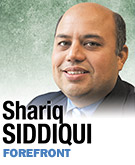Subscriber Benefit
As a subscriber you can listen to articles at work, in the car, or while you work out. Subscribe Now
 Indianapolis is home to three amazing institutions that try to improve public school education—The Mind Trust, Teach for America and IUPUI School of Education—but reform rhetoric is hurting their efforts.
Indianapolis is home to three amazing institutions that try to improve public school education—The Mind Trust, Teach for America and IUPUI School of Education—but reform rhetoric is hurting their efforts.
IUPUI has one of the most rigorous and innovative urban education teacher preparation programs. It provides two years of clinical training rather than just one semester; each student in the program receives coursework in English as a second language and special education and is prepared to teach in an urban environment.
Its research and clinical faculty have been heavily involved with Indianapolis urban schools, having helped co-found the Center for Inquiry, and are an intricate part of George Washington Community High School. The IUPUI footprint can be felt across the city.
Mind Trust is a national leader in education reform, promoting cutting-edge charter schools for Indianapolis.
Teach for America has a healthy presence and has been recognized as one of the country’s most innovative not-for-profit organizations.
Each institution realizes that a successful public education begins with an exceptional teacher. However, attacks on teachers and greater instability for the profession have reduced the number of teacher candidates.
Furthermore, only one-third of the Teach for America participants remains in teaching after they complete their two-year commitment, depriving schools of talented people who are on their way to becoming effective teachers. Research suggests that teachers get better each year during the first five years of their career. Replacing experienced teachers with novice teachers hurts the goals of all sides of the debate.
Attacks on the profession include confusing laws. New regulations by the previous superintendent of public instruction push for more stringent standards for students who aspire to become teachers through traditional schools of education while making it easier for graduates with no teacher preparation to become teachers.
Even those seeking to reform education have attacked the profession.
In an IBJ column last year, David Harris of The Mind Trust gave former Gov. Daniels advice about Purdue’s College of Education, quoting Art Levine of the Woodrow Wilson Fellowship Program about the lack of best practices among education schools—but failed to note that Levine had recognized Indiana education schools as leaders in innovation.
In fact, Indiana schools were the first in the country to adopt the Wilson program that creates pathways for scientists to become teachers.
All sides have reason to be frustrated.
Teachers are afraid of reformists. They suspect a more sinister plot. Some reformers have openly stated that they perceive public education to be like a cartel that needs to be destroyed to permit their vision of a free-market education system.
A public education system without government schools and teacher unions that assure living wages to teachers might make economic sense but does not ensure the professionalization of teaching. Teaching must be both a vocation and a profession.
On the opposite side is the frustration that teachers and teacher unions purposefully fail to self-regulate in order to maintain the status quo. Proponents of traditional public schools have criticized tests, but have not proposed alternative qualitative and quantitative measurement tools.
Bad teachers, while a minority, exist and there should be a mechanism to deal with them.
Attacks on the profession make it difficult to prepare and retain teachers. They prevent all sides from discussing the real issue—our children’s education. They hurt educational institutions in the country from delivering a quality education to our cities’ children.•
__________
Siddiqui is an attorney, doctoral student at Lilly Family School of Philanthropy at Indiana University, and publisher of Siddiqui Public Affairs Review. Send comments on this column to ibjedit@ibj.com.
Please enable JavaScript to view this content.
